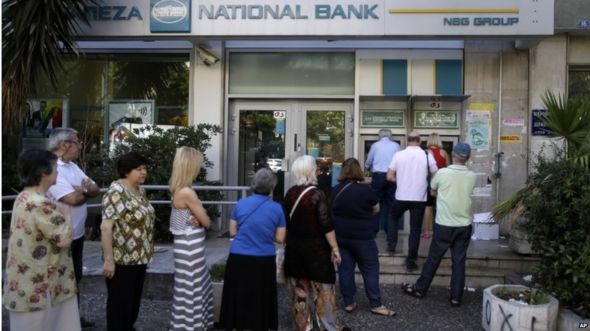 |
| Queues continued to form outside banks in Greece on Tuesday |
Greece debt crisis: Last-minute deal sought with EC to free up cash to repay the €1.6bn
European Commission President Jean-Claude Juncker has made a last-minute offer to Athens in a bid to reach a bailout agreement before the deadline expires on Tuesday, European Union and Greek government sources said.
The Greek government is therefore, reportedly, planning to request a new two-year bailout deal from the eurozone.
It comes just hours ahead of a deadline to repay €1.6bn (£1.1bn) to the International Monetary Fund (IMF).
Reports of the move to call for aid from the European Stability Mechanism (ESM) emerged as Greek leaders held talks over the European Commission's latest proposal for economic reforms.
If Athens accepts the EC deal, it will free up cash to repay the €1.6bn.
Amid fears of a Greek default on its huge public debt of €323bn - and a possible exit from the euro - long queues of people are continuing to snake from many cash machines in Greece, where withdrawals are capped at just €60 a day.
Media caption Greek deputy foreign minister Euclid Tsakalotos told the BBC's Katya Adler he believed a solution could be found
Greek banks were shut this week after talks between Greece and its creditors broke down.
However, up to 1,000 bank branches will re-open from Wednesday to allow pensioners - many of whom do not use bank cards - to withdraw up to €120.
A European Commission spokesman said the commission's president, Jean-Claude Juncker, was called by Greek Prime Minister Alexis Tsipras on Monday night.
The European Commission says the deal offered by Mr Juncker on Monday was identical to one made on Friday.
However, reports in Greece say the new offer is different to Friday's, and includes a change in terms to Ekas - a top-up given to poorer Greek pensioners. Athens does not want it scrapped before 2020, but Europe wants it phased out earlier.
The ESM, subject of the latest Greek proposal, provides financial assistance to eurozone members in order to keep the euro stable. It did not exist when Greece was bailed out in 2010 and 2012.
Resignation hint
A referendum is due to take place in Greece on Sunday over whether the country should accept the creditors' proposals.
EU leaders have warned that a rejection of the proposals would mean Greece leaving the eurozone - though Mr Tsipras says he does not want this to happen.
The EC says that if funds were to be released, Mr Tsipras and his party must back the "yes" vote in the referendum.
Under the offer, Prime Minister Alexis Tsipras would have to send written acceptance by today, in time for an emergency meeting of the Eurogroup of euro zone finance ministers to be held and agree to campaign in favour of the bailout in the planned July 5 referendum.
However, there was little sign that Tsipras was prepared to drop his repeated rejections of the bailout offer, which he has dismissed as a "humiliation" for Greece.
A Greek government official said that it listened with interest to what was being proposed but said: "Alexis Tsipras will vote "no" on Sunday".
